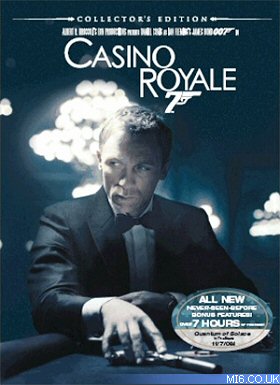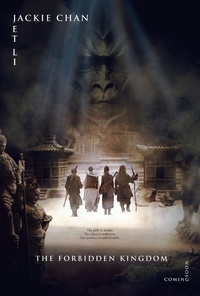Review: ‘Casino Royale’ 3-Disc Collector’s Edition DVD
 I’m not objective when it comes to James Bond. [[[Dr. No]]] was the first “grown-up” movie I ever saw, and I’ve been writing about 007 in magazines and my books ever since.
I’m not objective when it comes to James Bond. [[[Dr. No]]] was the first “grown-up” movie I ever saw, and I’ve been writing about 007 in magazines and my books ever since.
Nor am I particularly dispassionate about [[[Casino Royale]]]. The New York premiere at the great Zeigfeld Theater was the best experience I’ve had in cinemas for the last few decades — and it was there that I ate humble pie because, to my shame, I had been dead set against Daniel Craig in the role prior to that (I had been rooting for runner-up Henry Cavill, and anyone who’s seen him as “Charles Brandon” in the second season of Showtime’s [[[The Tudors]]] can see why).
The only thing I wasn’t a big fan of was the original, cautious, DVD release that didn’t even include an audio commentary. Naturally, everyone knew that a big special edition would eventually appear, and, following record-breaking grosses and a Blu-ray release that really put the medium on the map, this is it.
The film remains exceptional but quibbliable (some nitpick at the central, drawn-out poker game, while I cavil [if you’ll excuse the expression] at the dispassionate off-screen dispatching of the main henchmen, to be hastily replaced by some generic thugs for 007 to slaughter at the climax).
The three-DVD status of this Special Edition (tomorrow) is also questionable, since the second disc only contains the extras found on the original release, promoted to their own disc apparently to make way for the previously absent audio commentaries. Even the DVD menus aren’t particularly distinguished.
However, the approximately nine hours of new Special Features made it worth the wait. Having done forty good, bad, or ugly audio commentaries myself, I know a great one when I hear it, and Casino Royale now has two. The first, with director Martin Campbell and producer Michael Wilson, is packed with illuminating info (including that the opening was inspired by The Ipcress File and the finale by Don’t Look Now), but the second is even better.


 As we await the gourmet meal that The Dark Knight promises to be, a worthwhile hors d’ouevre to truly whet your appetite is
As we await the gourmet meal that The Dark Knight promises to be, a worthwhile hors d’ouevre to truly whet your appetite is 


 Any regular reader will no doubt have noticed something by now. I think I may have mentioned it once before, early on, but there should be no harm in repeating it: this column isn’t really for the big-time releases any DVD fan already know exist. Naturally, by all rights, I, like everyone else, should review I Am Legend
Any regular reader will no doubt have noticed something by now. I think I may have mentioned it once before, early on, but there should be no harm in repeating it: this column isn’t really for the big-time releases any DVD fan already know exist. Naturally, by all rights, I, like everyone else, should review I Am Legend Well, it’s SF week at the ol’ DVD Xtra. Not sci-fi week, but SF week, using the “official” contraction sanctified by the Science Fiction Writers of America, of which I was once a member. Now, if I were considering the likes of I Robot
Well, it’s SF week at the ol’ DVD Xtra. Not sci-fi week, but SF week, using the “official” contraction sanctified by the Science Fiction Writers of America, of which I was once a member. Now, if I were considering the likes of I Robot DVD special features are an invaluable tool for aspiring filmmakers. In addition to the discs that let you reedit sequences, there are many who simply present the filmmakers’ points of view in such a clever, informative, interesting, and edifying way that volumes can be learned with even a cursory viewing.
DVD special features are an invaluable tool for aspiring filmmakers. In addition to the discs that let you reedit sequences, there are many who simply present the filmmakers’ points of view in such a clever, informative, interesting, and edifying way that volumes can be learned with even a cursory viewing. Eight years ago an anime appeared that has stood, and even reverberated, the test of time. Blood: The Last Vampire was a groundbreaking and engrossing effort that clearly left virtually everyone who saw it wanting more. Clocking in at a breathless, seemingly unfinished, forty-eight minutes (just enough to fill a network TV hour slot), it showcased a pretty, young high school co-ed who swung a mean samurai sword against vampires at a Vietnam-era military base.
Eight years ago an anime appeared that has stood, and even reverberated, the test of time. Blood: The Last Vampire was a groundbreaking and engrossing effort that clearly left virtually everyone who saw it wanting more. Clocking in at a breathless, seemingly unfinished, forty-eight minutes (just enough to fill a network TV hour slot), it showcased a pretty, young high school co-ed who swung a mean samurai sword against vampires at a Vietnam-era military base. I hope you’ve already read Matt Raub’s advance review of Justice League: The New Frontier — DC Universe’s Animated Original Movie —
I hope you’ve already read Matt Raub’s advance review of Justice League: The New Frontier — DC Universe’s Animated Original Movie —  Note to producers: either retire words like “phenomenal” and “unbelievable” from your vocabularies or think thrice before allowing yourself to be filmed for DVD special features. Rest assured it will only help your cause. The aforementioned suggestion comes as a result of watching two long overdue DVD offerings back to back. If you watch only the extras, you’d think The Amateurs was the movie to see rather than The Nines. Neither movie will ever usurp the place of, say, the newly hi-deffed Lawrence of Arabia, but they surely prove how influential special features can be.
Note to producers: either retire words like “phenomenal” and “unbelievable” from your vocabularies or think thrice before allowing yourself to be filmed for DVD special features. Rest assured it will only help your cause. The aforementioned suggestion comes as a result of watching two long overdue DVD offerings back to back. If you watch only the extras, you’d think The Amateurs was the movie to see rather than The Nines. Neither movie will ever usurp the place of, say, the newly hi-deffed Lawrence of Arabia, but they surely prove how influential special features can be. It’s also great to compare the director/producer relationships. On The Amateurs, novice writer/director Michael Traeger is well served by temperate producer Aaron Ryder. On The Nines, writer/director John August is so outrageously lauded by producer Dan Jinks that the overstatements are hard to accept. Nevertheless, The Nines is the better film, which some critics, at the time of release, had a hard time understanding.
It’s also great to compare the director/producer relationships. On The Amateurs, novice writer/director Michael Traeger is well served by temperate producer Aaron Ryder. On The Nines, writer/director John August is so outrageously lauded by producer Dan Jinks that the overstatements are hard to accept. Nevertheless, The Nines is the better film, which some critics, at the time of release, had a hard time understanding. 








